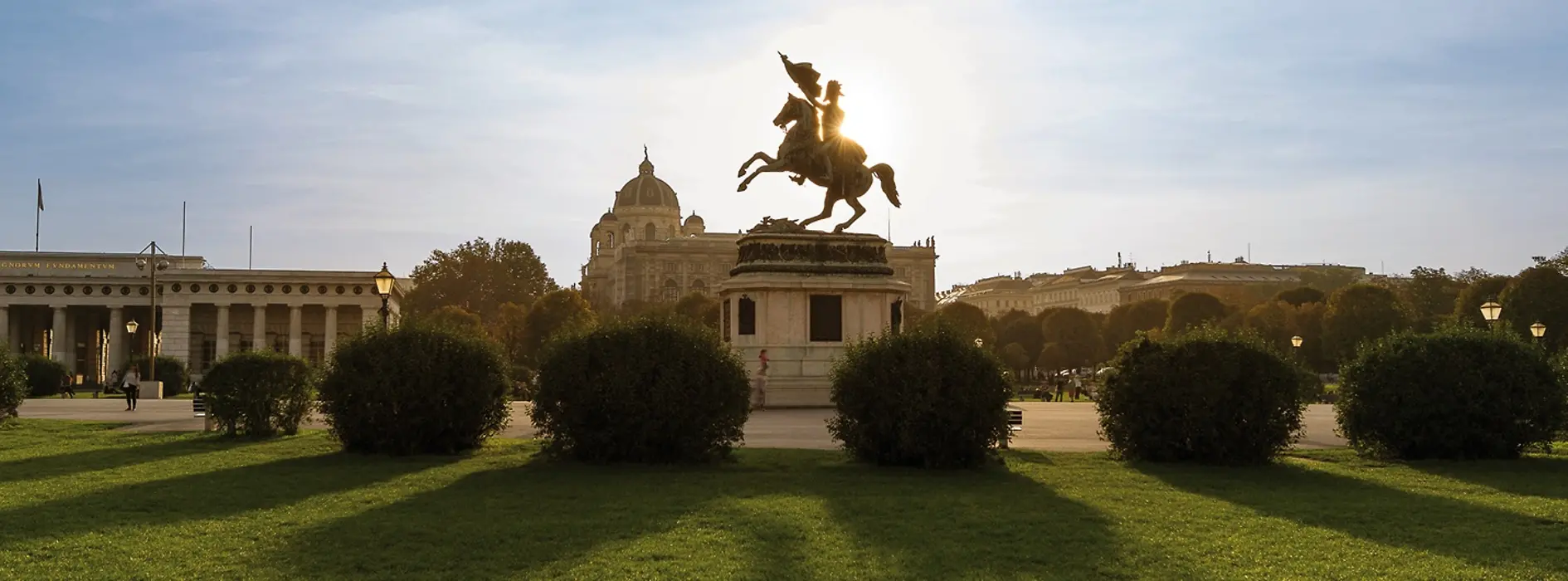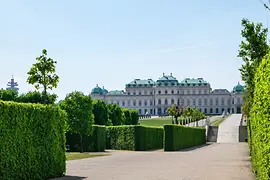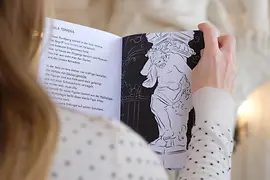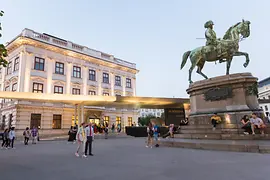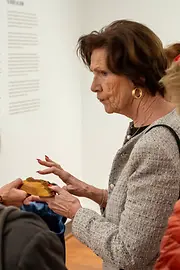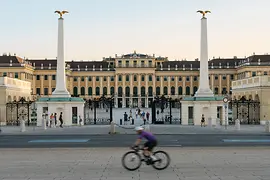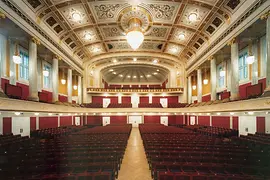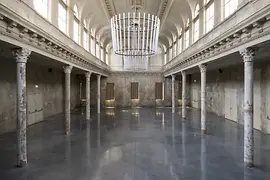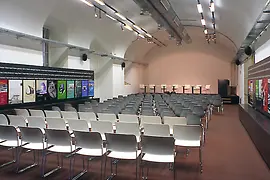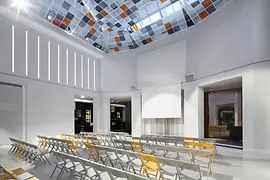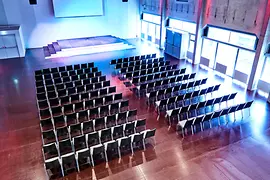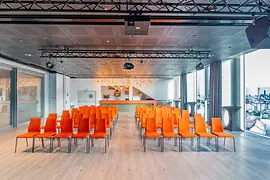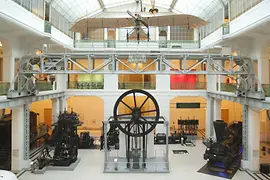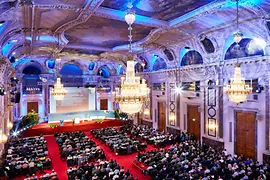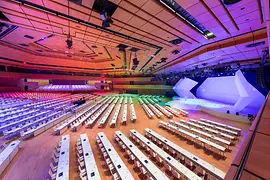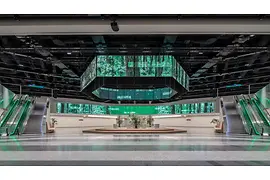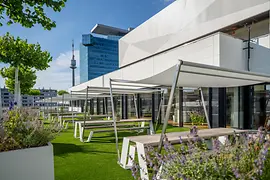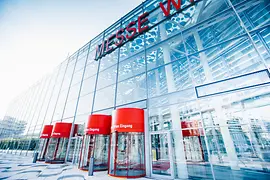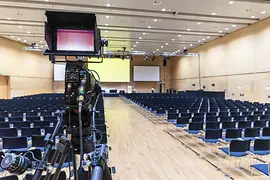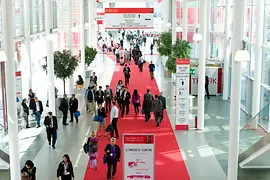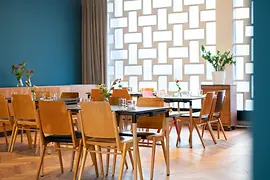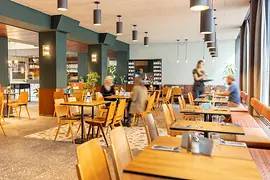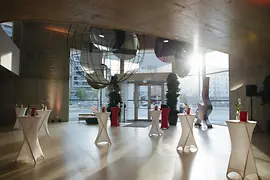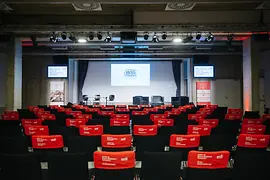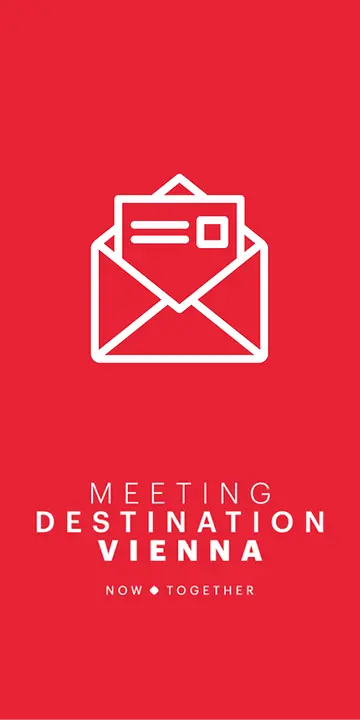Meetings For Everyone - Inclusive Venues and Offers For Your Event in Vienna
Events - whether congresses, incentives or corporate meetings - should provide an atmosphere where everyone feels safe. There are many aspects involved in creating an inclusive environment. A commitment to accessibility - ensuring that a meeting is accessible to people with disabilities - is often the primary focus. The World Health Organization (WHO) estimates that up to 1.3 billion people worldwide have some form of a disability. This represents approximately 16% of the world's population, or one in six people. The manifestations are many and varied, ranging from visual or hearing impairments and mobility restrictions (temporary or permanent) to physical or neurological disabilities.
There are, however, many more factors that may prevent active participation in events. Inclusive meetings should also consider aspects such as (potential) participants' family situation, origin, religion or gender, to name only a few. It is important to note that achieving inclusion is an ongoing process. Therefore, it is key to be actively involved in the conversation and continue to push for greater inclusion in the meetings sector.
Here are a few examples of Meeting Destination Vienna venues and partners that are promoting inclusion in a variety of ways.
Making art an experience for everyone
Vienna is internationally renowned for its unique art and cultural offerings. Many institutions offer specialized guided tours or services for people with disabilities to make the art on display accessible to everyone. These include, among others:
- The Belvedere is a place of exchange, working with focus groups and experts to develop inclusive services. These include participatory tours for people with dementia or memory loss and their caregivers, as well as inclusive tours in simplified language. Guided tours translated into Austrian Sign Language (ÖGS) and guided art viewings with a focus on multi-sensory communication are also offered for blind, visually impaired and sighted visitors. Additionally, Smartify's mobile audio tours have been expanded to include Austrian and international sign language video guides for the deaf.
- The Albertina has its own special services for blind and visually impaired, the deaf and mobility-impaired, as well as for visitors with trisomy 21 and dementia. The entire Albertina Museum is barrier-free.
- Schönbrunn Palace offers video guides in Austrian Sign Language (ÖGS) and International Sign (IS) as well as special guided tours for blind and visually impaired visitors, including access behind barriers.
- The Wiener Konzerthaus is barrier-free and offers assistance to visually impaired guests by escorting them to their seats or providing additional assistance at the venue as needed.
You can find all of these cultural locations in our Venue Finder. For more information, visit the Vienna Tourist Board website.
Straight to the meeting room
Mobility impairments are seldom an obstacle in Vienna's wide range of venues. From ground-level meeting rooms, such as those at the Architekturzentrum Wien, the Reaktor or the SAAL der Labstelle Wien, to elevator-accessible rooms such as the Ankersaal im Kulturhaus Brotfabrik, Lighthouse10 im Haus des Meeres or at the Technisches Museum Wien (detailed information about barrier-free visits), accessible venues are open to everyone. Similarly, all of the meeting rooms at the HOFBURG Vienna are barrier-free and tactile guidance systems (e.g. on handrails) provide additional orientation. Upon request, organizers can also rent rooms that can, among other things, be used as a retreat for visitors.
Bring your kids to a meeting
To promote the compatibility of family and career, and to enable people with children to actively participate in meetings, childcare is also provided at some venues. For large congresses of 5,000 people or more, the Austria Center Vienna offers childcare during regular congress hours. Age-appropriate, multilingual childcare services provided by professionally trained staff are also available to organizers of smaller meetings for a fee. Special requests (i.e., excursions, subject-specific content, etc.), extended care schedules, or support for children with special needs can also be arranged as needed. The Messe Wien Exhibition & Congress Center also has a room for childcare, which is run by "Die Kinderfreunde". If there is interest, the Messe Wien team will put meeting organizers and operators in touch with each other. Childcare arrangements can then be made on an individual basis. The demand for this service has increased significantly in recent years, demonstrating the growing importance of offering childcare during meetings.
Inclusive hosts
Several locations and partners also stand out for the inclusive approach they have adopted within the company itself. For example, the magdas HOTEL Vienna City, a social business, offers people with a refugee background an opportunity to work and provides them with the means to become hosts themselves. Located close to the Stadtpark (city park), the hotel is committed to sustainability and accessibility - including offering rooms for people with mobility, hearing and visual impairments. The mission of Vollpension is to combat social isolation and poverty among the elderly. In addition to the two coffee houses in Vienna where grandmas and grandpas conjure up the best cakes, there are numerous other ways to integrate the social business into events, for example through keynotes or the Buchtelmobil.
First and foremost, CAPE10 is a community space for everyone, including those affected by poverty and/or health problems, especially women, children and adolescents. But it is also home to a modern, barrier-free event location that can accommodate up to 320 people. Income generated from renting out the event space is an important source of funding for CAPE 10's community outreach projects.
Broadly speaking, there are numerous different factors to consider when organizing an accessible meeting. These considerations can help to create an environment that is inclusive and safe for all meeting participants - they include, but are not limited to:
- Provide quiet areas where people can retreat as needed (to rest, for religious purposes, etc.).
- Offer contactless registration to give people an additional option when checking in and consider different communication preferences and needs in general.
- Provide a wheelchair-friendly event layout with clear pathways and accessible seating options, including aspects such as registration desks and tables low enough for people in wheelchairs or of short stature to communicate at eye-level.
- Use colors and contrasts carefully, e.g. write the color on badges when using color codes.
- Include captioning and sign language translation options for keynotes, etc. and provide headsets for those who need them.
- If you are not sure which services attendees will need, ask them directly (e.g. during registration).
By prioritizing inclusion and implementing accessibility measures, including the selection of an appropriate venue, all interested parties will be able to participate in an event, including those who may not otherwise have had the opportunity to do so.
More information:
- General information about accessibility in Vienna
- Video initiative about mobility, art and culture from an accessible perspective
